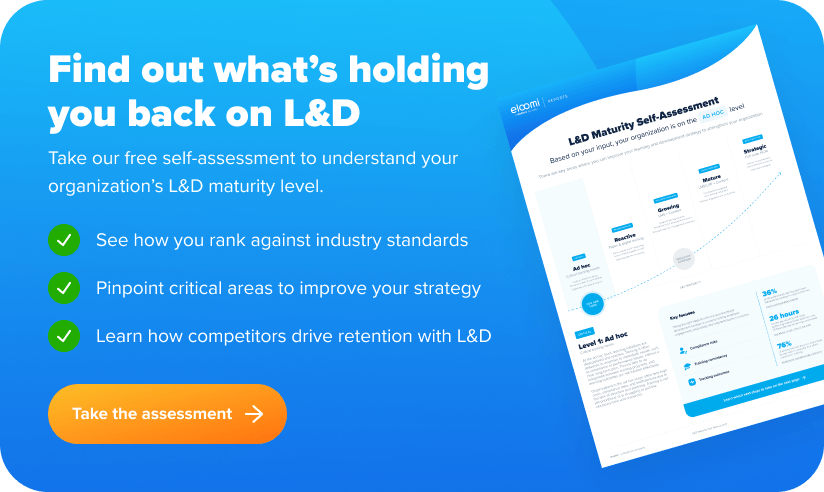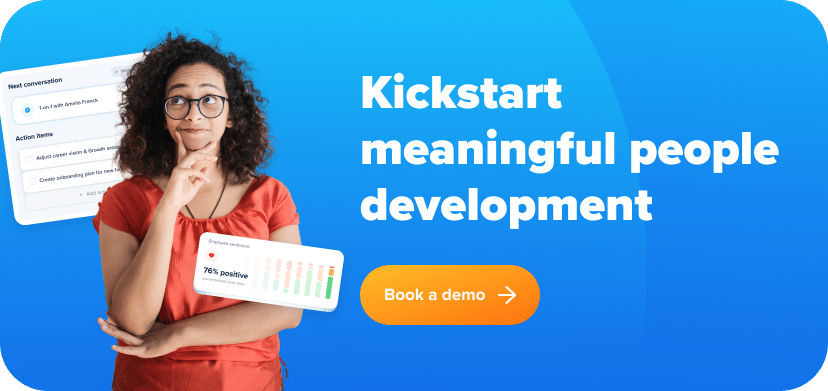What is performance management?
Did you know that managers spend an average of 210 hours per year in performance management activities? You might be wondering what that is and why it’s so significant.
Performance management is a collection of activities that an organization undertakes to help its employees improve their performance. It is a continuous process that HR managers use to focus on effectively implementing the Human Resource Management division’s objectives and find ways to boost future growth.
This can include setting standards, assigning responsibilities and providing the resources necessary to accomplish these responsibilities, evaluating employee development programs, and endorsing reward or corrective action. Hence, it’s more of a strategic tool focused on the relationship between overall contribution and organizational goals.
In this article, we will review the important differences between performance management and performance appraisal that you should know today.

What is a performance appraisal?
In a Pew Research Study, 57% of employees quit a job because they felt disrespected. This is where appraisal forms come in, as a means of making it clear where employees are doing well and areas for improvement.
Performance appraisal is a process and operational tool used by employers to evaluate the performance of employees. A performance appraisal system usually consists of an evaluation of workers’ past and present job performance, including an assessment of the employee’s progress toward goals, accomplishments and rewards, as well as an evaluation of the employee’s present and future potential.
It is a continuous feedback loop that takes into account performance against standards and goals, as well as any other information that may be relevant to the employee’s ongoing evaluation.
Performance appraisals (also called performance reviews or performance evaluations) are often conducted in formal settings that give the employer and employee a chance to discuss the employee’s performance. The frequency of performance appraisals varies.
In some cases, appraisals are conducted annually or semi-annually; in other cases, the appraisal may be conducted on a quarterly basis or even more frequently.

What is the difference between a performance appraisal and performance management?
Performance management and performance appraisals are two terms that are often used interchangeably, but here are some of the main differences to note:
Timing
The key difference between the two is that appraisals happen at the end of a period of time while performance management is an ongoing process that happens during the period.
Appraisals are done at the end of the performance period to evaluate employees’ performance against goals, expectations and standards. For example, an annual review is conducted at the end of the year.
Performance management, on the other hand, is a continuous cycle of activities that occur throughout the year. Performance management supports better and more timely decisions that help employees improve their performance.
It’s meant to be more of a conversation about work and how employees can do better. It also helps managers understand what needs to be done next in order for the company to reach its goals.
Role
Performance appraisals and performance management are two very different things in the eyes of the employee. While they are both tools that managers use to evaluate performance, they have very different uses and purposes.
To put it simply: in an appraisal, you’re evaluating your employee’s performance, while in a performance management system, you’re evaluating your employee’s behavior.
In an appraisal, managers usually use an objective, quantifiable scorecard to assess employee performance. As a manager, you may want to create a formal evaluation process that requires employees to provide specific examples of how they performed in their job duties as well as what they did well and what will help them to improve. This can also help foster employee performance reports in the long run.
On the other hand, performance management is more about building a relationship between the manager and the employee by focusing on improvement in a positive direction rather than focusing on errors or weaknesses. As a manager, you may want to focus on creating employee surveys and having more open discussions about goals for improvement for your team members so that you can support them and help them reach their full potential.
Scope
Performance appraisals and performance management are both workplace activities that involve regular evaluation of employees. However, their scope of focus is different.
Performance appraisals focus on the employee’s past performance and personal goals as well as a general discussion about what’s going well and what could be improved in the office. They are one-on-one employee evaluation meetings specific to an individual’s performance and thus have a more microscopic and limited scope.
Performance management adopts a more holistic approach and focuses more on the team’s goals and how the employee fits into them. Compared to appraisals, it has a much wider scope as it is a process that involves communicating guidelines to employees and then tracking their performance through regular meetings. This system encompasses both formal and informal feedback, which can be performed by any level of management in the company.
Methodology
The fundamental difference between these two practices is that the performance management process uses ongoing feedback in real-time while the performance appraisal process is conducted less frequently and is more focused on individual employee efficiency rather than team initiatives and overarching company goals.
Performance appraisals are normally conducted annually and usually take place between an employee and their direct manager. The employees are given an opportunity to reflect and share their level of job satisfaction and motivation, as well as other aspects of their employment.
The manager then evaluates the employee based on how well he or she has performed during the previous year and how that performance compares to expectations set by his or her superiors. After this evaluation is completed, the manager informs the employee of the results and discusses any areas for improvement. This meeting is typically followed by a review process and check-ins.
Performance management is often done through an online system that tracks employees’ productivity and performance levels throughout the work day. This type of management uses quantitative methods to evaluate employees’ work ethics, time management skills and ability to work with others while performing assigned tasks. Goal-setting software is often used too.
This approach offers a good level of transparency when it comes to evaluation and helps to observe performance with a more objective and less biased view.
Hence, performance management is a broader system that includes regular progress reviews, goal-setting and monitoring, and other processes designed to help employees improve their overall performance each year
Use eloomi for precise performance management and appraisals for your team
eloomi’s software for performance management and performance appraisals is designed to give you a bigger and more accurate picture of each of your employees and help you track their progress throughout the year.
With eloomi, you can see how each individual on your team is performing, what their strengths are, and the areas where they need improvement. You can get actionable insights to enhance your development plans and boost your HR department’s effective performance at your fingertips!
With eloomi, you can manage your employees the right way. Get started with a free demo now!







